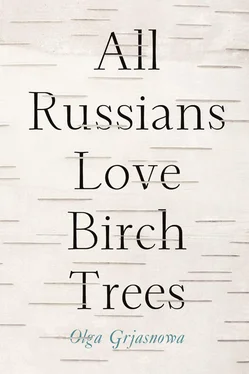She turned off the light, lit a few short candles, and disappeared into the kitchen. After rattling dishes for a moment, she returned with two soup plates. My palms were sweaty and I scooted forward to the edge of the sofa.
As I swallowed the first spoonful she looked at me expectantly. “This is chestnut soup. My grandmother’s recipe. First you caramelize the chestnuts, then douse them in stock and add a bit of white wine. Once the soup has boiled down I add sherry, puree it, and finally add seasoning.”
One of the candles had burned down and flickered out. The room was almost completely dark now. Tal leaned over me.
“I thought Israeli cuisine mostly consisted of salads and spreads,” I said. Tal erupted in laughter and sat back.
The meat was tender and I thought I discerned cinnamon, star anise, juniper berries, and a hint of dates. Tal served rice with fresh herbs, touching my knee as if by accident. The scent of herbs mixed with Tal’s subtle fragrance and I unabashedly studied her body. We didn’t talk much as we failed to find a topic of shared interest. Tal kept on refilling our glasses.
A cockroach skittered across the floor. We saw it in the pool of light from the streetlamp outside. Tal jumped up and killed it with her shoe, its shell cracking loudly. She wrapped the insect in her napkin and disposed of it in the kitchen. Later, she scooted closer, brushing the hair out of my face. I turned away and said, “Thank you! The food was wonderful.”
“Wait, I still have dessert,” Tal whispered into my ear. She lay her hand on my neck.
“I’m not a fan of desserts.”
“You’ll like this one, I promise.”
Tal stroked her fingernails over my wrist and returned to the kitchen, where she remained for quite a while. When she came back, she was carrying a bowl. Chocolate-covered strawberries. Take it down a notch, I thought, but she was already feeding me a strawberry. I chewed. She took my hand and told me to follow her up to the roof.
On the roof was a gigantic ugly aloe vera plant and a sofa that gave off a strong urine odor. We stood at the rail next to each other. It was a clear, quiet night. I named off the constellations, pointing to each and talking about them as if they were close friends. Tal listened, only moderately interested, and lit a match. I fell silent. The match went out. We could not have stood like this for long. And indeed soon Tal’s hand found itself — as if by coincidence — under my shirt’s collar. Her mouth close to mine. She pulled me in. She tasted of strawberries and chocolate.
“Good night,” I said firmly and took her hands off my body. She regarded me curiously, nodded, and saw me out. The staircase was brightly illuminated. Tal swayed. Standing in the door she stroked my cheek and said, “Till soon.”
At home I took as many sleeping pills as possible and stood with my back against the window, looking at my bed. I felt paralyzed, couldn’t turn around to the window, knew that down on the street I would see the dead body of that woman. I couldn’t bear the nights anymore. I was afraid Elias would die again, lying next to me. Often I woke up in the middle of the night, thinking I’d just heard him.
Tal was an activist. Communist. Feminist. And one thing she was most of all: complicated. Her activism and her ideology served as a facade to keep everyone out. Tal was one of the most interesting people I knew, except that I had no idea who she really was. She was a member of Hadash, the Arab-Israeli Communist party, and she was a member of Breaking the Silence and Anarchists Against the Wall. She spent most of her time at demonstrations or political meetings.
Tal had spent the first part of her military service with an elite unit that was stationed in the Occupied Territories. After half a year of training and four weeks on a mission during the second intifada, she went into the colonel’s office and said she’d rather spend the rest of her life in prison than serve another day in this military.
She was not put behind bars, but in the military bakery. After three weeks she went back to the colonel’s office. He gave her a long look and finally asked her to take a seat. He lit a cigarette and pushed the pack toward her. Tal was so nervous, she couldn’t sit still. The colonel spoke slowly to her: “This is really none of my business — I’m just doing my reserve service here. In two weeks I’ll be back home. I’m a chef. I work in a small restaurant in Tiberias and from my kitchen window I see the entire Sea of Galilee. I don’t know what objections you could possibly have to the bakery.”
“I want to go home,” Tal said.
She was discharged from the military on ideological grounds. Three days later she left the country. In Thailand and Vietnam she tried out every kind of drug, danced, drank, and slept with other Israelis who also had just finished their military service. In India she accidentally made a cake with laundry detergent. In general she never wanted to return to Israel. At some point she was picked up by an Israeli welfare organization, whose only representation abroad was in India and whose sole cause was cases like Tal’s. First she was forced to go cold turkey, then she was put onto an El-Al flight. Back in Israel, she joined Breaking the Silence, an organization that encouraged soldiers to speak up about the situation in the Occupied Territories. Ever since Tal stopped taking drugs she’d been haunted by what she’d seen and done.
She never announced her visits. Sometimes she rang my doorbell in the middle of the night, sometimes she visited me at my office. She had two Persian cats, big, lazy animals, overfed and with matted fur. Tal cared for them on a sporadic basis. During a good phase, she brushed one of the cats (never both), filled their bowls with delicacies, and constantly picked them up and held them in her lap. But if Tal was in one of her difficult phases, the animals would go without food for days on end. She treated me like her cats: sometimes with exuberant affection, sometimes coldly. We both knew what war meant and what it was like to see someone die. To let someone die. When I translated or when I drank my orange juice, I saw the light blue fabric slowly soaking up blood and the pool of blood on the sidewalk. I could reach out to her, touch her. I heard the voices of her murderers. More and more clearly. Most of the gun barrels that I saw were real.
The mood in the office was boisterous — our boss was on vacation. One colleague had even brought in cake to celebrate the occasion. I, too, did nothing except click through the entire Internet. Then I decided to call Sami in California from the office phone. I went into the kitchen and shut the door behind me. It was the only non-air-conditioned room in the building, so I opened the fridge door and stood in front of it for a while.
He answered on the first ring and didn’t bother with small talk, but got right down to business: “I can’t do this any longer. An Arab moved in next door.”
“So what?”
“Come on, Masha. You know how it is. He’s a real Arab, born and raised in Egypt.”
“But isn’t that what you are?”
“Precisely. When he found out, that’s when the shit hit the fan. He started inviting me over all the time, coming over unannounced, constantly borrowing stuff and never giving it back. At some point he found out that Minna is Palestinian and spat at my feet.”
“What?”
“He spat at my feet.” Sami laughed. “And you know what? That wasn’t all.”
“What else?” I asked.
“He also gave a little speech. You fled and left your land, your houses, and your families behind. The only reason you’re still alive is that you took up with the occupying forces.” As Sami recited this speech in Arabic he imitated the Egyptian accent, pronouncing the words especially hard and talking so fast and loud that it sounded hysterical. I couldn’t stop laughing, especially since Sami normally attached such importance to his Lebanese accent, which was softer and quieter than the Egyptian one. “Then he started insulting me as the representative of all Palestinians. You gotta hear this. Cowards, a disgrace to the Arab people, et cetera, et cetera, et cetera. And then the highlight: Your daughters are sleeping with Jews.”
Читать дальше












